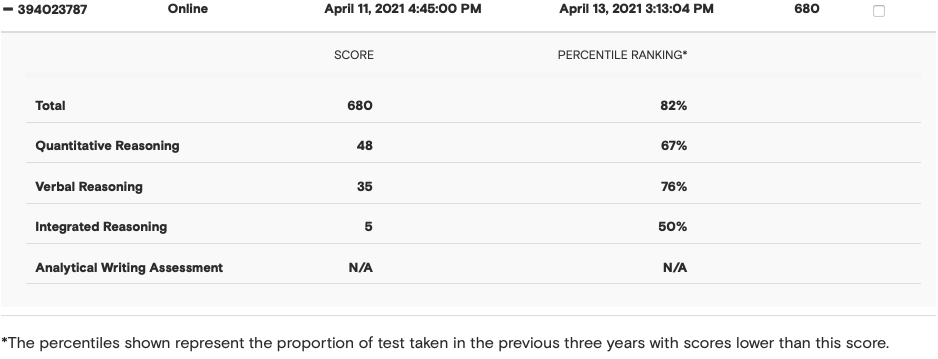Hi everyone,
The motivations behind this post are to toot my horn a little, share my GMAT experience, seek advise and tips.
[*] Online Exam on 4/11/21: 680 (Q48 V35 IR5)
[*] Materials used:
OG 2021, Manhattan 'All the -' set
[*] Practice tests:
GMAT Club tests (1 week free trial for subscribing to youtube channel), Manhattan Tests, 2 free GMAT Practice tests
[*] Prep:
My GMAT journey started last October, when I took a practice test without any preparation and scored a 580 (V38, Q32, IR5). After puttering around for a few weeks, prepping without intensity or discipline, I took a break around holidays and resumed my preparation with a new resolve in February. Manhattan/GMAT Club/
OG Online question banks were my go-to, and I focused a lot more on Quant than on Verbal and IR.
On Quant, I could see a clear improvement and even started scoring 50's and 49's consistently towards the end. Verbal - I watched all of GMATNinja's youtube videos, read through the entire Manhattan All the Verbal guide, and didn't practice much outside of mock tests and problem sets in Manhattan. My score wouldn't budge on Verbal but I decided to give the test and hope for the best because I was secretly scared that I will bomb disastrously and wanted to find that I suck sooner rather than later. All my mock tests leading up-to the test were at a 690-700 level (not counting Manhattan tests which I'm convinced are the mock-test equivalent of a toxic partner that makes you feel like crap).
[*] Test Experience:
I had learnt that the first questions matter a lot and was prepared to spend some extra time to get those right even if it meant that I lost time towards the end. But unfortunately the first Quant question stumped me (PS question. Asked for area of a right triangle in C-plane, with the trick being to recognize the arms using slopes, and thus quickly arriving at area). The answer i arrived at was not an option and couldn't see any connection between what I arrived at and any of the options. So at 3-4 minutes, guessed and grudgingly moved on. Fortunately my prep did help me get through the rest of the questions without trouble. I was again stumped just once on a probability question (Probability of selecting 2 odd numbers in a set of 5 numbers randomly selected from first 20 positive integers - still haven't looked up how to/attempted to solve after the test), but guessed and moved on. Ran out of time for the last 4 -5 questions, so guessed, but didn't do that quickly enough. MISSED answering the last question.
Similar experience for Verbal. Was on track until 3/4ths the way, got slowed down on a RC, and then eventually had to guess the last 2-3 questions. BUT AGAIN, MISSED the last question. Was so mad at myself going into IR that I'm surprised I scored what I scored.
I also found it annoying that proctors ping randomly during your test and check if you're ok or to warn not to talk (I was mumbling aloud sometimes). Nowhere was it mentioned that 'mumbling aloud' was not permitted during the test (afaik).
------
[*] I sincerely believe that I have potential to score above 750. Am I being greedy/day dreaming?
[*] Since I only want to do part-time program my friend recommends that I be happy with my score and go on to applying. My goal is to get into part-time MBA programs at Kellogg/Booth. I'm also interested in checking out Foster, as I live in Seattle. With 5 years of experience in 2 well-known companies, what are my chances of getting either of the three?
[*] To score a higher mark in Verbal - quickly (assuming I only have another 3-4 weeks to give my second and final attempt) - are there any strategies and tips? Would much appreciate them.
Cheers!
Attachments
File comment: Score

Screen Shot 2021-04-14 at 7.07.23 PM.png [ 41.85 KiB | Viewed 1142 times ]





